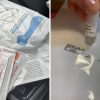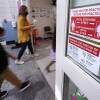In May 2020, as Massachusetts was in furious competition with the rest of the world to obtain high-quality masks and other personal protective equipment to protect front-line workers from COVID-19, Gov. Charlie Baker announced millions of dollars in grants to local companies to create a “domestic” supply chain for this critical material.
But as school districts across the state — and just about everybody else — have scrambled in recent weeks to procure high-quality masks to combat the surge of omicron cases, Massachusetts apparently has not bought any masks from the suppliers it paid about $7 million to build production lines for N95 masks.
On GBH’s Boston Public Radio on May 21, 2020, Baker said the state needs to “make sure we have domestic ability to manufacture and distribute” personal protective equipment and testing materials that “we’ve been spanning the globe to deliver to people. It can’t be like that going forward.”
That same day, Baker announced a $2 million grant to Boyd Technologies in Lee, Mass., for “equipment for surgical and N95 production lines” and $1.2 million to ViruDefense in Burlington, Mass., to “expand surgical N95 manufacturing through purchase of new equipment.”
But Boyd CEO Stephen Boyd told GBH News Monday, “The state is not currently buying any masks from Boyd Technology.”
ViruDefense was bought by a New Jersey company last March. The company did not respond to requests for comment and an attempt to order masks through their website received no response.
In October 2020, the Baker administration announced another round of grants, including $2.8 million to Shawmut Manufacturing in West Bridgewater that, with investor The Fallon Company, was planning to “buy equipment for a locally-owned, vertically integrated N95 mask plant in Massachusetts.”
Baker toured the Shawmut plant on March 10, 2021, saying the state was proud to have helped establish the production line and “we look forward to continuing to work with innovative companies like Shawmut Corporation and The Fallon Company to keep residents safe and strengthen our economy.”
But the state hasn’t bought their masks.
Shawmut CEO James Wyner told GBH News in an email Monday, “We received one order for 100,000 masks for the Mass. State police just after launch. Other than that, we haven’t had any purchases from larger Massachusetts institutions, either private or public.”
Wyner said the manufacturing line was built from scratch and they had more than 150 people employed at the plant last year, but that has dwindled to a handful because they are not selling many masks. “Overall demand for our N95s is a very small fraction of what the plant was set up for,” he said. “We have plenty of capacity available and would love to support the needs of the commonwealth in the midst of the current crisis.”
With the return to school last week amid high COVID-19 casecounts, school districts have been rushing to get masks for their staff and students.
The state Department of Elementary and Secondary Education provided KN95 masks to schools, but teachers quickly took to social media with photos of substandard masks and questions regarding their effectiveness.
There’s an important difference between KN95 and N95 masks: Though they’re supposed to meet the same standards, KN95 masks are produced under a Chinese mask standard, which has less rigorous testing requirements. “There's no regulatory oversight,” said Anne Miller, executive director of Project N95, a nonprofit that was set up at the beginning of the pandemic to distribute high-quality masks. “There's nobody checking production. There's no way of knowing that any KN95 is any good, unless it is regularly tested by somebody.”
A DESE spokesperson at first said the masks’ filtration efficacies had been tested by MIT, but the department later backtracked and said they had not been. Some were deemed less than 50% effective through MIT testing. According to the department, the masks were supplied by the Massachusetts Emergency Management Agency.
The governor's office did not explain why the state is not buying masks from the local producers that were given grants to produce masks, saying only, “The goal of [the grant] program was to increase PPE production to support front-line workers at a time where supply chains for PPE were strained.”
School districts across the state have taken different tacks in the effort to keep their staff and students safe, depending, in part, on the quality of the masks they received from the state.
In Salem, Superintendent Stephen Zrike said they received an initial shipment from DESE of KN95 masks to distribute to staff and teachers when school reopened after the holiday break. Zrike said every teacher received 30 masks.
He’s aware of the controversy surrounding the state’s recent distribution, but Zrike said, “What I’ve been told is that [the KN95 masks are] better than the cloth masks and surgical masks we have been giving out to people.”
Like other districts across the state, Salem is now looking to buy more masks for students, teachers and staff using federal pandemic relief funds. Zrike said he’s asked his finance department to look into it and may place an order through a New York company that sells masks in student and adult sizes.
At Wrentham Public Schools, Superintendent Allen Cameron told GBH News he received 6,000 of what he called “the non-defective brand” of KN95 masks from DESE to give out to 200 teachers and staff. He said they’re now looking to get more.
And in Arlington, a community group called Safer Air = Safer Schools says they launched a crowdfunding effort and were able to provide over 6,000 vetted KN95 masks to school staff, students and community members. Eliza Perez said the group took the action to obtain authentic masks for the community “at a time when supply lines are challenged.”
Michael Morris, Superintendent of Amherst-Pelham Regional Public Schools, told GBH News that his district had concerns about the quality of masks the state was offering as early as last year, so they have been buying their own masks from a New York–based retailer. The school district is now requiring all students and staff to wear either a surgical mask or a KN95 mask, and it is providing masks to anyone who does not have their own.
Questions over the distribution of masks have dogged the administration, with Massachusetts Teachers Association President Merrie Najimy criticizing Baker and DESE Commissioner Jeff Riley for insisting that the masks provided to teachers were effective and MIT-tested. The MTA is demanding an investigation into the state’s actions and wants an agency independent of DESE to take over the distribution of personal protective equipment to students and educators.
The legislature’s Joint Committee on COVID-19 & Emergency Management & Preparedness will hold an oversight hearing Tuesday on the state’s response to the omicron variant and has invited Baker and Secretary of Health and Human Services Marylou Sudders to testify.
“We have questions related to the status of the Commonwealth's stockpile of emergency-related supplies,” Joint Committee Chairman Rep. Bill Driscoll, Jr. told GBH News in an email. “Also, whether or not the Administration anticipates distributing additional high-performance masks to teachers and staff as was done prior to the return to school in 2022.”
The state’s grant program to build up local mask production was run through the Manufacturing Emergency Response Team, a public-private partnership created in March 2020 to coordinate industry, academic and government efforts to help manufacturers pivot to production needed for the pandemic. The Massachusetts Technology Collaborative, which managed the M-ERT, claims on its website that the project grants led to the in-state manufacturing of more than three million masks by April 2021.









